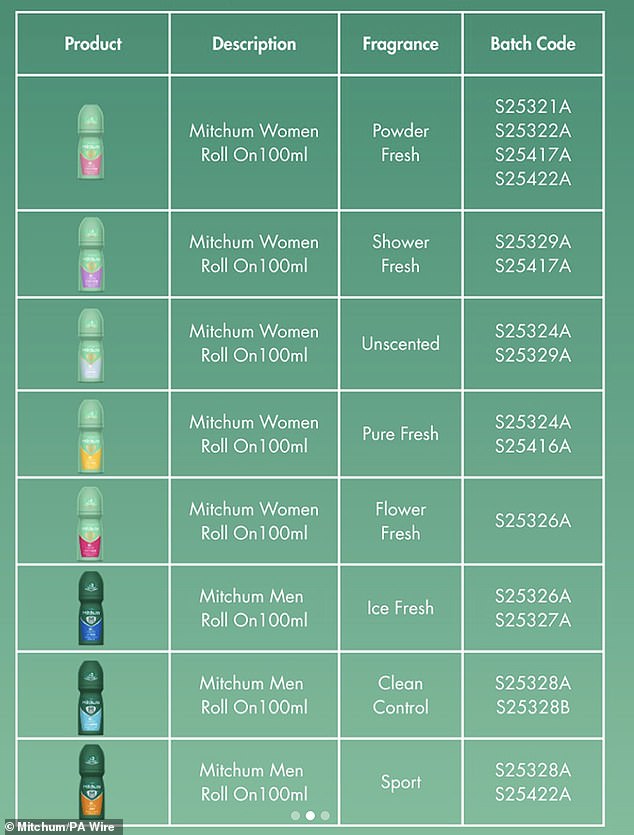Most of us rely on some form of deodorant to help keep our underarms fresh. But just how good for your health are they really?
Last month, Mitchum deodorant had to issue a product recall after users started complaining of burns and rashes.
The company was forced to acknowledge that ‘a change in the manufacturing process affecting one of our raw materials’ had caused the issue.
And this isn’t the first time deodorants (which stop you smelling) and antiperspirants (which stop you sweating) have caused controversy.
The internet is awash with scaremongering stories of all the ways these products could harm you. So, which are true? Here, Claire Coleman separates fact from fiction with a myth-busting guide…
MYTH: THEY CAN CAUSE SKIN IRRITATION
TRUE OR FALSE? True
‘Reactions usually occur in people with sensitive skin, eczema, or allergies,’ says Dr Sonia Khorana, a GP with a special interest in dermatology. ‘Often it’s a combination of factors such as applying right after shaving when the skin barrier is disrupted.’
According to consultant dermatologist Dr Sina Ghadiri, fragrances are one of the most common ingredients responsible for allergic contact dermatitis — or skin irritation brought on by an allergic reaction. ‘For those who know they have sensitivities to fragrance, seek out fragrance-free products and do a patch test.’

According to consultant dermatologist Dr Sina Ghadiri, fragrances are one of the most common ingredients responsible for allergic contact dermatitis

Last month, Mitchum had to issue a product recall after ‘a change in the manufacturing process’ caused problems for users
But it’s not just fragrances that can cause problems.
‘Some products will contain alcohol that can strip the skin barrier and cause stinging, dryness or irritation,’ says Dr Khorana. ‘Aluminium salts –the active ingredients in antiperspirants – are generally safe but, in some people, they may cause stinging, itching or irritation, particularly if applied to shaved or broken skin.
‘Essential oils, such as tea tree, lavender and citrus oils, are usually marketed as “natural”, but these are still really irritating, and citrus can make skin more sensitive to sunlight too,’ says Dr Khorana.
MYTH: DEODORANTS CAUSE CANCER
TRUE OR FALSE? False
There’s a lot of fearmongering around the use of deodorants and an increased risk of cancer, specifically breast cancer, but to date there is no evidence for this.
Two of the ingredients usually highlighted as being of cause for concern are parabens – preservatives often used in products like these – and aluminium. But, according to Cancer Research UK, there really is nothing to worry about.
‘Some studies in rats reported that parabens might act like the hormone oestrogen,’ they explain on their website. ‘Because oestrogen is involved in some breast cancers, people may worry parabens could be linked to breast cancer. But there’s no reliable evidence that parabens cause breast cancer in people.’
Similarly, they conclude, ‘the best studies have shown no link between aluminium, deodorants and breast cancer’.
MYTH: SPOTS OR CYSTS CAN BE CAUSED BY ANTI-PERSPIRANTS
TRUE OR FALSE? True
Reddit forums are packed with users complaining that anti-perspirants cause painful cysts, boils or spots. While this isn’t an issue for everyone, when it is, you’ll know about it.
This happens partly because aluminium salts react with the proteins in sweat, causing a temporary plug in the sweat gland. ‘This can lead to cysts which, in turn, can increase the risk of infection and need for antibiotics and drainage,’ says Dr Khorana. ‘I’d advise washing and exfoliating the area regularly.’

Cancer Research concludes that ‘the best studies have shown no link between aluminium, deodorants and breast cancer’
MYTH: DEODORANTS CAN CAUSE BREATHING DIFFICULTIES AND DEATH
TRUE OR FALSE? True
If you Google ‘has anyone ever died from using deodorant?’, you will find a number of incidents of people suffering cardiac arrests after inhaling spray deodorant – either intentionally or by mistake.
After one such death in 2023, a spokesperson for RoSPA, the Royal Society for the Prevention of Accidents said: ‘Inhaling large quantities of aerosols, not just deodorants, can lead to a whole host of life-endangering scenarios – from blackouts and breathing difficulties, to heart rhythm changes and sadly, death.
‘There’s a common misconception that fatalities from aerosols only happen in a substance abuse scenario, but this is absolutely not true. We have seen a number of fatalities over recent years where children and young adults have over-sprayed aerosols.’
It is thought solvents and propellants used in aerosols can sensitise the heart to adrenaline, triggering a fatality. Ultimately, if deodorant is used as directed, in small amounts and in well-ventilated areas, it shouldn’t cause any issues.
MYTH: THEY CAN CAUSE PIGMENTATION PROBLEMS
TRUE OR FALSE? Maybe
Some reports suggest regular use of anti-perspirants or deodorants can cause dark patches of skin under the arms, and Dr Ghadiri acknowledges this is a possibility, but says, ‘However, it is important to stress there are many other causes for this.’
‘Conditions like acanthosis nigricans – a darkening of the skin on the body, which can be related to diabetes and hormone disorders, among other things – can easily be missed, or attributed to other causes. So go to your doctor if you notice dark patches on your armpits,’ he adds.
MYTH: ANTI-PERSPIRANTS CAN GIVE YOU ALZHEIMER’S
TRUE OR FALSE? False
Studies have shown that people with Alzheimer’s do appear to have higher levels of aluminium in their brains, but this is thought to be a consequence of Alzheimer’s rather than a cause.
Still, people have expressed concerns about the daily use of products that contain aluminium salts, as antiperspirants do. However, the science simply doesn’t show this is a problem. According to Alzheimer’s Research UK, ‘currently, no research proves that day-to-day exposure to environmental metals causes Alzheimer’s.’